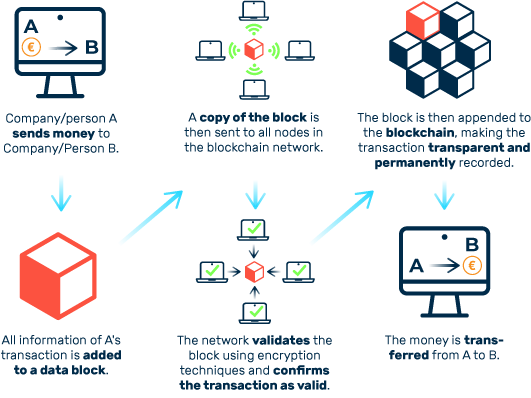Blockchain technology has already made a significant impact on various industries, including finance, supply chain management, healthcare, and real estate. As blockchain continues to mature, it’s exciting to imagine the possibilities of how this technology can transform other sectors in the future.
What is Blockchain Technology?
The blockchain is a distributed ledger that duplicates and distributes transactions across the participating network of computers. It is difficult to hack or manipulate. It is a database where users enter and store information. Scripts are the programs that perform tasks like entering, accessing, saving, and storing information. The network requires agreement before modifying or deleting the data stored in blocks. This is to ensure chronological consistency, resulting in a chain of blocks. Blockchain technology allows to share information transparently within their network by storing data in these blocks. The system has built-in safeguards that prevent unauthorized access and ensure consistency in the shared view of transactions. Multiple computers in a network host the digital ledger, where the owner’s digital signature authorizes every transaction, ensuring high security.
How does the Blockchain work?
To understand how blockchain works, we can break it down into steps. First, users record the transaction, which shows the movement of physical or digital assets from one party to another in the blockchain network. Once the participants have reached a consensus, they write the transactions into blocks equivalent to the pages of a ledger book. They append a cryptographic hash to the new block, which acts as a chain that links the blocks together.
Finally, the system distributes the latest copy of the central ledger to all participants. Each additional block strengthens the verification of the previous block and therefore the entire blockchain. This ensures that the blocks and chains link securely, and users cannot edit them. If the contents of the block are intentionally or unintentionally modified, the hash value changes. This provides a way to detect data tampering.

Key Features of Blockchain Technology
The distinct features of blockchain include decentralization, which transfers control and decision-making power from a centralized entity to a distributed network. This promotes transparency and reducing the need for trust between participants. This also prevents any one participant from controlling or degrading the network’s functionality.
The use of digital signatures ensures blockchain’s high level of security. It prevents fraud, corruption, or changes without a specific digital signature. The blockchain’s immutability is another essential feature, as no participant can tamper with a recorded transaction on the shared ledger. When an error occurs, the network requires the addition of a new transaction to reverse it, and both transactions are visible to ensure transparency and easy verification of all transactions. The programmability of blockchain technology allows for the automation of actions, events, and payments when certain trigger criteria are met, streamlining processes, and reducing the risk of errors or delays. Establishing rules for participant consent to record transactions is crucial to blockchain technology. New transactions can only be recorded when the majority of participants in the network give their consent. This promotes fairness and accountability while preventing unauthorized transaction entries.
History of Blockchain Technology
Since the early 1990s, researchers have been exploring the idea of using cryptography to secure digital communications. This led to the development of blockchain technology. However, it was only in 2009 that the first blockchain system, Bitcoin, was created by an unknown person or group using the pseudonym Satoshi Nakamoto. Bitcoin is a decentralized digital currency that is used for online transactions without the need for a central authority like a bank.
The unique feature of Bitcoin lies in its underlying technology, the blockchain. The blockchain is a digital ledger that records every transaction that occurs on the Bitcoin network. A network of computers around the world maintains it, making it extremely difficult to tamper with or hack. Various industries have adopted blockchain technology beyond just cryptocurrency over time. It has found use in everything from supply chain management to voting systems, and its potential applications continue to expand. Today, blockchain technology is a crucial tool for creating more transparent, secure, and efficient systems across a wide range of industries. As the technology advances, we are likely to see even more innovative uses for blockchain emerge in the years to come.

Future of Blockchain Technology
Blockchain technology is a rapidly growing field that has the potential to transform various industries, including finance, healthcare, supply chain management, and more. The future of blockchain technology looks promising due to its potential to revolutionize various industries. It is an attractive technology for businesses and organizations looking to enhance their operations and build trust with their customers.
Use Cases of Blockchain
One of the most significant potential use cases for blockchain is in the realm of decentralized finance (DeFi), which leverages blockchain to create financial products and services that are more accessible, efficient, and secure than traditional finance. DeFi has already started to disrupt the financial sector, with the total value locked in DeFi protocols reaching over $100 billion in early 2022. The growth of DeFi has the potential to bring financial services to millions of people.
Another area where blockchain technology could have a significant impact is in the field of supply chain management. By using blockchain to create a tamper-proof and transparent ledger of all transactions in the supply chain, companies can enhance their supply chain visibility, improve the tracking of products and materials, and reduce the risk of fraud and counterfeiting. This can lead to more efficient and cost-effective supply chains, as well as improved product safety and traceability.
As the technology continues to evolve and mature, it is likely that we will see even more innovative use cases and applications emerge. In conclusion, the future of blockchain technology looks bright. It has potential to transform various industries and create new opportunities for businesses and individuals.
To know more about the use cases of blockchain technology, click here.
